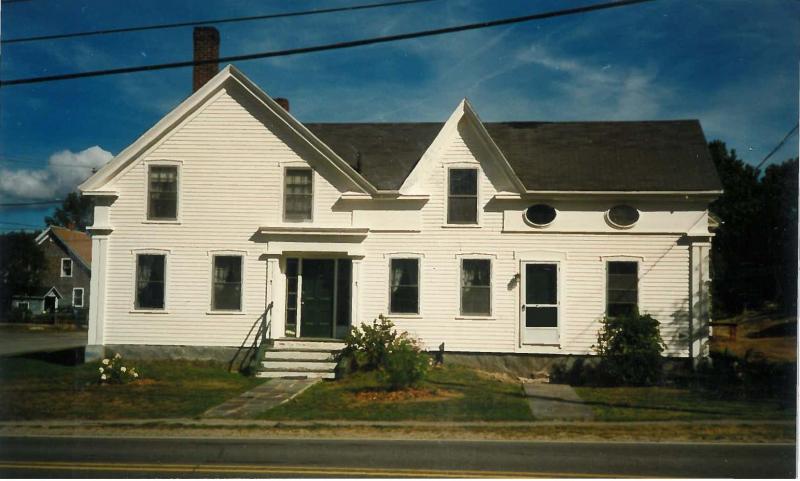In part I of this article, I described visiting Pete Jones in 1985 to talk about pogie factories. His father Jainus came here as a bookkeeper for a pogie factory. Pete, born 1899, went to Boothbay schools and on to higher education. He became a teacher in private and public schools in Massachusetts and he worked in insurance. Because the factory of his childhood here was shut down much of the year, I asked what the workers did in the quiet time. Pete answered, "They just about starved to death," and went on to say, “Have you ever heard the expression 'getting over March hill'?" I said that I hadn't. Then he said, “If you made it through March, up over March hill, you'd probably make it through the year. They did just about anything they could to survive."
Laid off or Side Jobs
We did the same, “just about anything,” when I was young in a very, very mild way. When my father was laid off from the East Boothbay shipyard he worked at in the 1950s, he and a friend made wooden rabbetted picture frames which were glued together, and they drove them to Boston to a dealer. The awful smell of the horse foot glue pot seemed perennial since it would often be going day and night for days or weeks, with breaks when deliveries were made. Though it was in the shop/attached barn, the smell seeped into the house. But then almost all the men in the yards had a side job for layoffs or after hours: saw sharpening, joiner work, carpentry, fishing, clamming, wallpapering, and so on. It was hard then to support a family on shipyard pay alone.
My father could do mechanical drawing, so he also had a side job of drawing up plans for those who wanted them. He got paid, but not at the rate of a licensed architect. He’d left Rensselaer Polytechnic Institute before graduating. The war started and he wanted to help in the war effort and never went back. During the war he was in the drafting department at Curtiss-Wright in Buffalo and wasn’t allowed to enlist, though he tried to, because of his “vital defense work.” He felt badly, like a shirker, for not taking the risks that enlisted men were. Once we moved to Maine in 1952, other side jobs to increase his family income were ironwork he made with his forge and wooden coffee and end tables. He’d send them to Buffalo or sell them locally. I like walking into houses around here and seeing one.
“Hardship”
We had surface water lines in East Boothbay which were drained in freezing weather. The worst hardship I endured as a kid in East Boothbay in the 1950s was having to depend on cisterns for winter water and having to flush the toilet with buckets of the scant weekly bath water used by all four of us. When things were bad, my father allowed about 2½ inches in the tub, which my mother warmed up between bathers with a teakettle. It was pretty cold in that shallow water. Rationing of water was a daily feature from October 15, when the pipes were drained to when water was turned on. If there was no January thaw, a fairly normal respite for water users, snow was shoveled into the cistern. Pretty tame stuff compared with starvation—that was supposed to be somewhere else far away. I realized I had a lot to learn.
Most of the houses then had wood or oil heat, and that heat normally had to find its own way through the house, though some homes had central heating. Certainly we didn’t. Many awoke in the morning to find their bedside glass of water frozen. A couple generations earlier, Lester Barter, born 1906, woke up to find his breath frozen on the covers in an icicle.
Over the years I've tried to educate myself to the point that I can put into perspective whatever I've learned about the past here. I’ve been mindful of Pete's words and they've been borne out. Times here were very hard for a good part of the population and those times were glossed over, maybe because hardship was a fact of life and there was no particular reason to dwell on it, except for considering solutions. Or maybe because people were reluctant to readily talk about raw hunger, foreclosure, and death from malnutrition, freezing, and associated diseases. But talking to people over 80 in about 1990, I learned startling things about how people did and did not get by in the early decades of the 1900s and what it was like to try.
Getting By
The needs back then were clothing, feeding, and warming yourselves. For most, survival depended on your time being taken up with those tasks. To do less than work from dawn to dusk and after dusk to that end added a measure of uncertainty to your future welfare. You just went out every day and scrabbled for what you had to have. You ate what you grew or gathered and you supplied a commodity—maybe just a strong back— to trade for the things you could not get yourself such as molasses, flour, shoes, and spices. Any leisure back along was devoted to such tasks as knitting potheads or nets, whittling plugs, sharpening tools, cutting wood, or making clothes. The idea of spending time on anything that did not directly help you stay alive now or in the indefinite future was absurd. You worked hard, not to send your kids to college or to buy a camp on a lake, but to stay alive. I doubt I would have ever learned so much so fast about Boothbay's past without Pete's dramatic memorable words—he was a natural-born teacher.
































